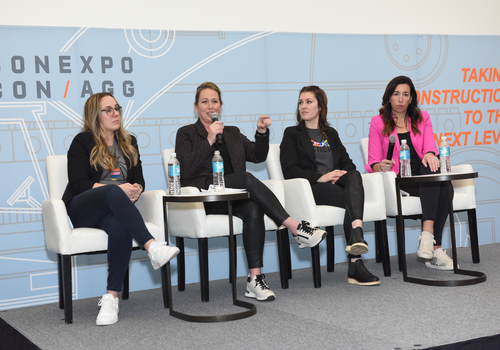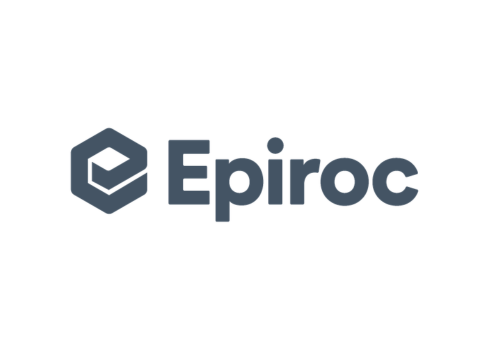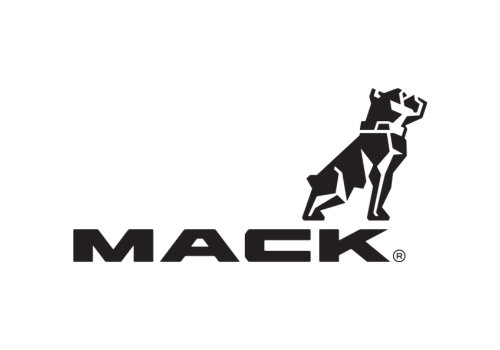In the construction industry, diversity, equity and inclusion (DE&I) is more than just fostering a welcoming environment for all employees, it is essential for the long-term viability of companies. One organization making significant strides in this area is Crew Collaborative. Founded in 2020, Crew Collaborative started from a group chat among women in construction and quickly evolved into a powerful force advocating for workforce development and inclusion. CONEXPO CON/AGG 365 spoke with Kristina McMillan, Founder of Crew Collaborative (Crew), on how construction companies can improve their DE&I practices, inspired by CREW’s journey and experiences.
CREW COLLABORATIVE CREATION
McMillan recounts the humble beginnings of the non-profit organization. "It really started with a group chat on Instagram," she says. A diverse group of women, all connected by their work in construction, expressed their shared frustrations and aspirations for the industry. This collective desire to foster change led to the creation of Crew. "We all had a love for construction, but we also had a lot of frustration surrounding the industry and what needed to change specifically for women at that point," McMillan explains.
By 2020, the group had held its first retreat, and despite the pandemic, they pressed on with their mission. "We decided to actually have our first retreat in July. We had an agenda in place, things that we wanted to discuss. We came up with a logo because we knew we were going to be something. We had sponsors like Caterpillar, AEM, Toro and Shell Oil," McMillan recalls.
INCLUSIVITY BEYOND GENDER
One of the first major decisions made by Crew was to expand their focus beyond just women in construction. “We did not want to just be women,” McMillan explains. “We love the men that we’ve worked with and the mentorship and support we’ve received over the years.” This inclusive approach underscores the importance of involving everyone in the conversation about DE&I, recognizing that true progress requires the collaboration of all genders. Crew’s board started out as 50 percent men and 50 percent women, and that’s still true today.
“There’s a lot to be said for the fact that there’s a lot of women in construction groups that are already out there doing really great work,” McMillan continues. “But the way that we see it, we need to have men and women working together in order to create actual change.”
MAKING A DIFFERENCE
Crew has developed several impactful programs within the construction industry that help to not only create a more inclusive industry – but to find and inspire the future workforce, which is needed in nearly every trade.
- Classroom Talks: Launched to engage high school students and introduce them to career opportunities in construction. "We always tell the presenters, you only have to impact one student to make a big impact in someone's life," says McMillan, adding that one of the most inspiring parts of these talks is seeing a kid’s face light about a career in construction.
- Ambassador Program: Designed to empower individuals to advocate for the industry and share their experiences. “We’ve had individuals go through the ambassador program who are now proactively working in the industry,” McMillan says. The group has more than 125 ambassadors. Anyone interested in applying can do so online, with training happening in the spring and fall each year.
- Framework Program: An ambitious program still in development, focusing on comprehensive workforce development. “Framework is the big beast of a program that's not quite launched yet, but it's going to take a lot of money and support and backend work to make that happen,” McMillan explains.
These initiatives highlight the importance of early engagement and continuous advocacy to attract diverse talent to the construction sector.
We did not want to just be women. We love the men that we’ve worked with and the mentorship and support we’ve received over the years.
Kristina McMillan
Founder, Crew Collaborative (CREW)
NORMALIZING DIVERSITY
McMillan emphasizes the need to normalize diversity rather than spotlight it excessively. “We think it’s more important to just show it,” she says. The goal is to integrate diversity seamlessly into the workplace so that it becomes a natural aspect of the industry rather than an exception. “We cannot diversify an industry by making people feel like they are separate.”
Celebrating all workers is key. “Just show them doing a great job. That they are the right person for the job. They're passionate about industry, just like you are.”
This approach helps in reducing resistance and fosters a more inclusive environment. “We think anytime you beat someone over the head with an ideal or try to force something down their throats, there's going to be resistance that is really unnecessary,” McMillan observes. “If you just normalize it without them even knowing, it makes things a lot easier.”
AUTHENTIC DE&I POLICIES
When asked about the necessity of formal D&I policies, McMillan offers a nuanced perspective. “I don’t know that there is a right answer,” she admits. The effectiveness of such policies hinges on their authenticity and the genuine commitment of the company to implement them. “So many times you have these companies with extensive DE&I programs, but there’s no real action there,” she explains. “They don’t even necessarily understand what DE&I means. If that’s the case, it’s not worth the piece of paper it’s written on.”
McMillan underscores the importance of understanding the distinct components of DE&I. “Diversity can relate to race, sexual orientation or gender. Equity is about treating people equally and making them feel valued. Inclusion ensures everyone feels included and respected,” she says. This is not working if you're only paying attention to adding certain groups of people to your team just to tick a box. “You have to make sure that they feel equally treated.”
COMMUNITY ENGAGEMENT
For construction companies looking to improve their inclusion practices, McMillan advocates for grassroots engagement. “People need to take responsibility and get out into their communities,” she asserts. Whether it’s sponsoring local events, participating in community activities or directly engaging with underserved populations, these efforts can significantly enhance a company’s appeal to diverse talent. In the past, companies were more engaged at a local level with activities like sponsoring banners or T-shirts at a little league game. Seemingly small acts like talking with other parents about their kids' goals and sharing the many opportunities the trades have can have a ripple effect.
“Look at your team, look at the community, figure out what you’re missing, and then go engage with those people,” she advises. “Nothing is ever going to be more impactful than direct face-to-face interaction with your community.”
LONG-TERM BENEFITS OF DE&I
The long-term benefits of investing in DE&I are substantial. As McMillan puts it, “We need them [workers] more than they need us.” A diverse and inclusive workforce is essential for addressing the labor shortages facing the construction industry. Companies that embrace DE&I are better positioned to attract and retain top talent, fostering innovation and growth.
“Pretty much every industry has some sort of labor shortage right now,” McMillan notes. “If you can't understand why we need to diversify, then you probably aren’t reading this part of the article anyways.”
LEADERSHIP’S ROLE
Leadership plays a critical role in fostering inclusive workplaces. McMillan advises that leaders should understand their workforce and create an environment where employees feel comfortable sharing their experiences. “Understand what brings them joy,” she says, stressing the importance of recognizing employees as whole individuals with diverse needs and aspirations.
“There isn't a one-size-fits-all to this question,” she continues. “Every team and every sector is going to be a little bit different. But having ways that your team can engage with each other and making sure you understand their long-term goals and passions, is key. We don't just need to recruit these people. We also need to retain them.”
MENTORSHIP AND TRAINING PROGRAMS
Mentorship and training programs are vital for preparing the next generation of construction workers. Despite some resistance from seasoned employees, these programs are essential for knowledge transfer and skill development. Companies must communicate the importance of these initiatives and create a supportive environment for all employees.
“I think you have to remember, respectfully, at the end of the day, you are still the owner and you're the boss,” McMillan says. “You have to explain to your existing team that in order for us to continue to do business and grow, we have to be open to bringing new people on.”
EMBRACING CHANGE
Crew’s journey and insights provide a valuable blueprint for construction leaders committed to improving diversity and inclusion within their companies. By learning from their experiences and implementing new strategies, construction companies can build a more inclusive, innovative and resilient industry for all.
Looking ahead, McMillan advises construction companies to embrace change and remain adaptable. The industry is evolving, and companies that fail to adapt risk being left behind. By fostering a culture of continuous improvement and inclusivity, construction companies can ensure their long-term success and contribute positively to the industry’s future.
“Understand when to ask for help and be willing to change the way you’re doing things,” she says.
Stay tuned as we explore Workforce Developments topics this summer. Your journey to a safer, more productive work environment begins here, with CONEXPO-CON/AGG 365. Be sure to subscribe to the newsletter here so you don’t miss any news.
5 Tips for Leaders
1. Understand Your Workforce
Take the time to understand your employees' individual goals and passions. Recognize them as whole individuals, not just workers. This approach fosters a sense of belonging and commitment.
2. Promote Inclusivity Naturally
Normalize diversity by integrating it seamlessly into your workplace. Avoid making it feel like an exception. Celebrate all workers for their skills and contributions, creating a more inclusive environment.
3. Engage with the Community
Get involved in local community activities and events. Whether sponsoring local sports teams or participating in community service, these efforts enhance your company’s appeal and demonstrate your commitment to inclusivity.
4. Implement Mentorship Programs
Establish mentorship and training programs to support knowledge transfer and skill development. Ensure seasoned employees understand the importance of these initiatives for the company’s growth and sustainability.
5. Embrace Change and Adapt
Stay open to change and be adaptable. The construction industry is evolving, and companies that embrace continuous improvement and inclusivity are better positioned for long-term success. Seek help when needed and be willing to adjust your strategies.
Photo credit: Crew Collaborative











